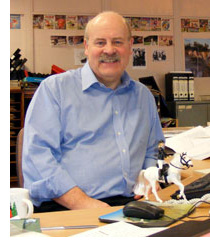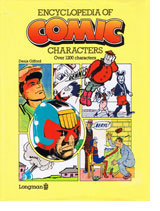 There’s a great interview with Bill Graham over on the comic site Down The Tubes right now.
There’s a great interview with Bill Graham over on the comic site Down The Tubes right now.
Bill who? Well, I thought the same when I first heard about it on the DTT blog, but it turns out that he was one of those unsung heroes of British comics. He edited the likes of Warlord, Starblazer library, Spike, The Crunch, Buddy, Champ and Football Picture Story Monthly for DC Thomson, as well as working on titles like The Hornet, Commando library and The Wizard – as he himself says, “At one time it felt like I was editing about half our output!”
It’s particularly interesting to be able to trace the editorial connections between some of these titles, because in comparison with the papers of rival publisher IPC/Fleetway, in the years I was at my comic reading peak, DC Thomson offered no clue as to the writers, artists or editors involved in their juvenile lines. Instead, the ink-smudge fingered fan had to resort to detective work, devouring whatever books on comic art were available (and in those days, there were not many about), and cross-referencing the anonymous work in DC Thomson titles with attributed work in IPC comics.
 The baseline for my early days of forensic comics investigation was the work of Denis Gifford, though in later years there were some useful books written by Alan Clark (sadly not the testosterone Tory). However, most of those writing about comics back then were, unsurprisingly, more interested in the papers of their own youth than the slowly imploding trade of the 1980s or beyond. That said, Gifford did provide bounty in the form of his Encyclopedia Of Comic Characters, a thoroughly useful alphabetised and indexed work which logged many of the most important or memorable characters in British comics right through to the (then) present day. Each entry included a brief précis of the character, a thumbnail picture, and most importantly the name of an artist associated with the character. Given the whole situation with companies not creators owning the characters (a situation hardly that much changed to this day), this did mean that there were blind spots, but that book did shine a light onto the otherwise impenetrable world of DC Thomson in particular. I used the book, borrowed from my local library, to develop a series of notebooks. In these I backtracked from the index to create a dictionary of artists, in which I logged the various strips they were confirmed to have worked on, and to which I added those strips which I myself had identified them to have worked on. I can even remember the specifics of how I went about it, down to the type of pens I used (colour coding developing as I expanded my project to include writers, colourists and others) and the notebooks in which I wrote.
The baseline for my early days of forensic comics investigation was the work of Denis Gifford, though in later years there were some useful books written by Alan Clark (sadly not the testosterone Tory). However, most of those writing about comics back then were, unsurprisingly, more interested in the papers of their own youth than the slowly imploding trade of the 1980s or beyond. That said, Gifford did provide bounty in the form of his Encyclopedia Of Comic Characters, a thoroughly useful alphabetised and indexed work which logged many of the most important or memorable characters in British comics right through to the (then) present day. Each entry included a brief précis of the character, a thumbnail picture, and most importantly the name of an artist associated with the character. Given the whole situation with companies not creators owning the characters (a situation hardly that much changed to this day), this did mean that there were blind spots, but that book did shine a light onto the otherwise impenetrable world of DC Thomson in particular. I used the book, borrowed from my local library, to develop a series of notebooks. In these I backtracked from the index to create a dictionary of artists, in which I logged the various strips they were confirmed to have worked on, and to which I added those strips which I myself had identified them to have worked on. I can even remember the specifics of how I went about it, down to the type of pens I used (colour coding developing as I expanded my project to include writers, colourists and others) and the notebooks in which I wrote.
But time marches on, I boiled the marrow out of the book, having renewed it to the max on my ticket, and life moved on. The notebooks went away, and it wasn’t until last year, when I finally bought a second hand copy of the Encyclopedia online, that I came to think of that project again. And now more pieces of the puzzle come together: I get into eBay, through which I’ve managed to fill holes in my collection (a complete collection of Spike, which was one of the few titles of the day to completely elude me at the time; the odd copy of The Crunch and Champ – easily two of the best DC Thomson boys’ titles of the 70s/80s), and this fascinating Bill Graham interview. Because for so long the only voices we heard on the subject of UK weeklies were from that milieu of late seventies freelances working mainly at IPC (your basic Pat Mills-John Wagner-Alan Grant axis), it was those voices which underlaid any attempt at a narrative in the development of British mainstream comics through from the sixties into the nineties. Certain opinions became accepted orthodoxy: writing on girls’ titles was superior to that on boys’ titles until the Battle/Action/2000AD revolution, IPC titles were uniformly grittier than DC Thomson ones, DC Thomson was institutionally dour, and so forth. So it’s great to hear such a stout defence of DC Thomson’s output from Mr Graham. That’s not to say that it’s a complete refutation of those orthodoxies which developed, just that it helps develop a more rounded picture to the fan on the outside.
Sorry, rambling. Basically, a great interview to read for anyone with an interest in UK comics. I suppose it’s yet more incentive to pull my finger out and get on with working on my book 😮 And, for that matter, to finish off a blog post on UK comics that I started writing ages back, based around an exchange of letters ages back with (IIRC) Dave Hunt of Eagle. Though both might first require a certain friend to pull her finger out and send me back that book she borrowed… *hint hint*


